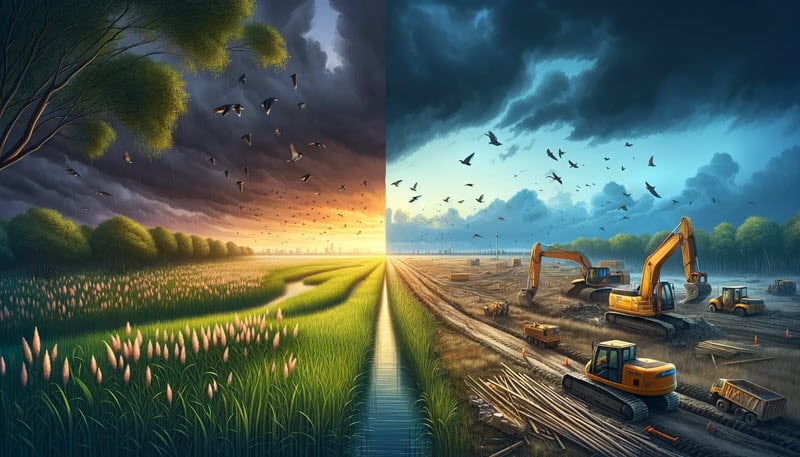
In a groundbreaking new report by the U.S. Fish and Wildlife Service (USFWS), the alarming trend of wetland decline across the United States has been meticulously documented, shedding light on an environmental crisis that has far-reaching implications not only for biodiversity but for human well-being as well. This comprehensive analysis reveals a worrying acceleration in the loss of these critical habitats, underscoring the urgent need for concerted conservation efforts. Wetlands serve as the lifeblood of our planet’s ecological framework. They are not merely waterlogged spaces but vibrant ecosystems that play a pivotal role in water purification, flood control, carbon sequestration, and as biodiversity hotspots. Despite their undeniable importance, wetlands have been vanishing at an alarming rate due to urban expansion, agriculture, climate change, and pollution.
The USFWS report highlights several key factors contributing to the decline. Among them, urban development stands out as a significant culprit. As cities expand, the conversion of land for housing, infrastructure, and commerce often comes at the expense of wetland areas. Additionally, agricultural practices, including the drainage of wetlands for crop production, have led to substantial losses. The impacts of climate change, such as rising sea levels and increased frequency of extreme weather events, exacerbate the situation, further threatening these fragile ecosystems.
The consequences of wetland degradation are profound and far-reaching. Wetlands are among the most productive environments on earth, providing essential services that benefit humanity and the natural world. They act as natural water filters, removing pollutants and sediment from waterways, and they are crucial for water storage, helping to mitigate the impacts of floods and droughts. Moreover, wetlands are vital for carbon storage, playing a significant role in the fight against climate change. Biodiversity loss is another grave consequence of wetland decline. These ecosystems are home to a rich variety of species, many of which are specially adapted to the unique conditions wetlands provide. As wetlands disappear, so too do the species that rely on them, leading to reduced biodiversity and the loss of species critical to ecosystem health.
The USFWS report serves as a clarion call to action, emphasizing the need for robust conservation strategies to halt and reverse the decline of wetlands. Protecting what remains is paramount, and this requires a multi-faceted approach involving government, communities, and individual action. Policy measures such as stronger environmental regulations, incentives for wetland conservation, and the implementation of sustainable land-use practices are critical steps in the right direction. Restoration efforts also play a key role in the recovery of wetland ecosystems. Projects that focus on re-establishing wetland hydrology, replanting native vegetation, and removing invasive species can help restore these areas’ ecological functions and biodiversity. Such efforts, however, require significant investment, expertise, and community involvement to be successful.
Public awareness and education are essential components of wetland conservation. Many people are unaware of the critical role wetlands play in our environment and everyday lives. Increasing public understanding of these ecosystems’ value and the threats they face can foster greater support for conservation initiatives. The USFWS report is a stark reminder of the challenges wetlands face, but it also presents an opportunity to galvanize action. By documenting the continued decline of these vital ecosystems, the report provides a scientific basis for the urgent need for conservation. It is a call to all stakeholders—governments, conservation organizations, communities, and individuals—to come together in a concerted effort to protect and restore wetlands.
The decline of wetlands is a pressing environmental issue with significant implications for biodiversity, climate change mitigation, and human well-being. The latest USFWS report sheds light on this critical issue, providing valuable data that can inform and inspire action. Through a combination of policy measures, restoration projects, and public engagement, it is possible to halt the loss of wetlands and ensure these invaluable ecosystems continue to thrive for generations to come. The time to act is now; the future of our planet’s wetlands—and all the life they support—hangs in the balance.
#WetlandConservation #SustainableDevelopment #EnvironmentalAwareness #HabitatProtection #ClimateAction #Biodiversity #EcoFriendlyLiving #GreenInfrastructure #ConservationEfforts #ProtectOurWetlands
